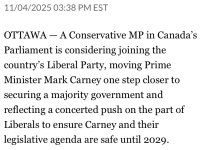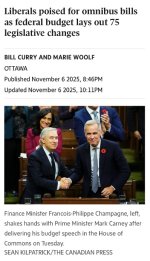Couldn't find the thread with recent postal work stoppage news but am thinking now they almost have the balance they are looking for with 1/3 less employees on a rotating picket line. Eventually the Union will figure it out. Most important is the Union reps continue to be paid in full. It's a dying job so may as well milk it for what you can get is what I see.
Well, today is the Liberal/NDP Non-Coalition Coalition Budget Day!
- Thread starter Ron in Regina
- Start date
You are using an out of date browser. It may not display this or other websites correctly.
You should upgrade or use an alternative browser.
You should upgrade or use an alternative browser.
I wonder what this cost?

 apple.news
I’m sure this guy’s constituents didn’t elect him as a liberal MP, but maybe there’s an ambassadorship after Parliament for him now, etc…?
apple.news
I’m sure this guy’s constituents didn’t elect him as a liberal MP, but maybe there’s an ambassadorship after Parliament for him now, etc…?
Conservative MP joins Canada’s Liberal government, moving Carney closer to majority government — POLITICO
The stunning twist brings the prime minister one step closer to a secure hold on the office until 2029.
ambastardorship.I wonder what this cost?
I’m sure this guy’s constituents didn’t elect him as a liberal MP, but maybe there’s an ambassadorship after Parliament for him now, etc…?
Conservative MP joins Canada’s Liberal government, moving Carney closer to majority government — POLITICO
The stunning twist brings the prime minister one step closer to a secure hold on the office until 2029.apple.news
Sad but true…anyway…Couldn't find the thread with recent postal work stoppage news but am thinking now they almost have the balance they are looking for with 1/3 less employees on a rotating picket line. Eventually the Union will figure it out. Most important is the Union reps continue to be paid in full. It's a dying job so may as well milk it for what you can get is what I see.


Elbows elbowing. The Liberal government’s budget, unveiled Tuesday after months of delay, forecasts a $78.3-billion deficit for fiscal 2025-26, the third highest (all three from Liberal Governments) in Canadian history and the highest ever in a non-pandemic year. The projected deficit is within the range of non-government estimates from recent months…which isn’t great.
John Robson: Mark Carney's deficit exploding budget is elbows up, IQs down — National Post
Is the world really that uncertain? Compared to what, 1938?

Finance Minister François-Philippe Champagne said this budget marked a “generational investment” so that Canada could supercharge its economy (Which means literally nothing). The deficit forecasts, he said, are “in the range people expected.” (???) What people?
With nearly $80B in red ink, Carney racks up largest ever non-pandemic deficit in federal budget — National Post
Finance Minister François-Philippe Champagne said this budget marked a 'generational investment' so that Canada could supercharge its economy
Canada’s debt will cost taxpayers an estimated $53.4-billion this year in interest payments. Those interest costs are expected to climb to $76.1-billion by the end of the decade as the government expects it will add to the national debt by about 25 per cent over that period.
Tuesday’s budget also formalized the government’s move to begin separating day-to-day operational spending and capital investments, those expenditures geared more towards boosting long-term growth.
Critics, however, say the move was designed to allow the government to claim that it has balanced the operational side of its books within three years, with the focus no longer on the actual full budget.
Federal budget forecasts $78B deficit as Liberals shift spending to capital projects — The Canadian Press
This year's federal budget contains a deficit nearly twice the size forecast
Well, that escalated quickly…I wonder what this cost?
I’m sure this guy’s constituents didn’t elect him as a liberal MP, but maybe there’s an ambassadorship after Parliament for him now, etc…?
Conservative MP joins Canada’s Liberal government, moving Carney closer to majority government — POLITICO
The stunning twist brings the prime minister one step closer to a secure hold on the office until 2029.apple.news


Nova Scotia MP Chris d'Entremont leaves Conservative caucus to join the Liberals — The Canadian Press
The Liberal party confirms that Nova Scotia MP Chris d'Entremont is joining i
Crazily, this is November 4th, and the above story is dated November 5th, so maybe this isn’t suppose to be “decided” upon until tomorrow?
Deputy Conservative leader Melissa Lantsman said that d'Entremont "made his choice" not to do the job Conservative voters sent him to Ottawa for…seven months ago…
Caching caching caching . Their is money in Parliment .Well, that escalated quickly…
View attachment 31882
View attachment 31883This move puts the Liberals two seats shy of a majority government and being able to pass their budget without opposition support.
Nova Scotia MP Chris d'Entremont leaves Conservative caucus to join the Liberals — The Canadian Press
The Liberal party confirms that Nova Scotia MP Chris d'Entremont is joining iapple.news
Crazily, this is November 4th, and the above story is dated November 5th, so maybe this isn’t suppose to be “decided” upon until tomorrow?
Deputy Conservative leader Melissa Lantsman said that d'Entremont "made his choice" not to do the job Conservative voters sent him to Ottawa for…seven months ago…
This is the second time in one year that the tabling of a major Liberal government financial document has been overshadowed by an MP’s resignation. In December 2024, the Trudeau government’s fall economic statement was eclipsed by then-Finance Minister Chrystia Freeland’s shocking stepping down.Caching caching caching . Their is money in Parliment .
d’Entremont resigned by letter to Poilievre shortly after he made a stunning revelation to media outlet Politico: that he was “considering” crossing the floor to the Liberals and would make a decision “in the coming days.” The MP did not immediately respond to a request for comment.
Nova Scotia MP Chris d'Entremont crosses floor from Tories to Liberals on budget day — National Post
This is the second time in one year that the tabling of a major Liberal government financial document has been overshadowed by an MP's resignation
Ambassador., special envoy . Some kind of gravy only available to the hoi polloiThis is the second time in one year that the tabling of a major Liberal government financial document has been overshadowed by an MP’s resignation. In December 2024, the Trudeau government’s fall economic statement was eclipsed by then-Finance Minister Chrystia Freeland’s shocking stepping down.
d’Entremont resigned by letter to Poilievre shortly after he made a stunning revelation to media outlet Politico: that he was “considering” crossing the floor to the Liberals and would make a decision “in the coming days.” The MP did not immediately respond to a request for comment.
I wonder what the going rate of “instant consideration” is going for?
Nova Scotia MP Chris d'Entremont crosses floor from Tories to Liberals on budget day — National Post
This is the second time in one year that the tabling of a major Liberal government financial document has been overshadowed by an MP's resignationapple.news
If the Carney Liberals were truly concerned about acting in the best interests of Canadians, it should have been relatively easy to reach across the aisle to the Conservatives and forge a bipartisan consensus. This would have shown the world that Canadians are united in a common purpose and would have the potential to truly move the country forward.
Instead, they have given us yet another in a long line of big government, big spending budgets that will burden Canadians for generations to come, and may even destabilize the minority government, further delaying the hard work that needs to be done.

 apple.news
(YouTube & PM Carney oversells and under delivers federal budget)
apple.news
(YouTube & PM Carney oversells and under delivers federal budget)


(YouTube & The Front Bench breaks down the federal budget and what it all means)
Instead, they have given us yet another in a long line of big government, big spending budgets that will burden Canadians for generations to come, and may even destabilize the minority government, further delaying the hard work that needs to be done.
Jesse Kline: Carney trolls Canada with claim buyers want 'low carbon' oil — National Post
Budget 2025 is another Liberal exercise in central planning


What it means is that Canada is beyond hope .If the Carney Liberals were truly concerned about acting in the best interests of Canadians, it should have been relatively easy to reach across the aisle to the Conservatives and forge a bipartisan consensus. This would have shown the world that Canadians are united in a common purpose and would have the potential to truly move the country forward.
Instead, they have given us yet another in a long line of big government, big spending budgets that will burden Canadians for generations to come, and may even destabilize the minority government, further delaying the hard work that needs to be done.

Jesse Kline: Carney trolls Canada with claim buyers want 'low carbon' oil — National Post
Budget 2025 is another Liberal exercise in central planningapple.news
(YouTube & PM Carney oversells and under delivers federal budget)
View attachment 31889
View attachment 31890
(YouTube & The Front Bench breaks down the federal budget and what it all means)
$50+ billion in interest payments per year and yet our politicians rank in top 1% of income earners.
Also don't see it as fair if the debt is split equally amongst the provinces and territories. There comes a point when people have to realize they are in a bad deal and get out. Takes us back to the 350 years per civilization theory.
Also don't see it as fair if the debt is split equally amongst the provinces and territories. There comes a point when people have to realize they are in a bad deal and get out. Takes us back to the 350 years per civilization theory.
Late on Tuesday, Sebastian Skamski, former director of media relations in the Opposition Leader’s office, posted on X, stating: “Just 40 days ago, Chris d’Entremont said his constituents were hurting under Mark Carney’s government & warned that another massive Liberal deficit would make things worse.

 apple.news
“Canadians are hurting. Families are being forced to cut deeply into their grocery budgets just to get by. And, frankly, that leaves me a little bit angry and a little bit sad.”
apple.news
“Canadians are hurting. Families are being forced to cut deeply into their grocery budgets just to get by. And, frankly, that leaves me a little bit angry and a little bit sad.”
Canada is a wealthy country, d’Entremont said, but he suggested that under the Liberal government it’s being mismanaged.
“Since I was first elected in 2019, the cost of living has skyrocketed. And families (in his riding have been) struggling. We warned the Liberals that out-of-control spending and massive deficits were irresponsible. But, of course, they didn’t listen. And now after six months under a new prime minister who promised financial discipline, Canadians are still waiting.
But that’s sooo almost 6 weeks ago so…?
The prime minister said he’d be judged by the costs at the grocery store, states d’Entremont. “Well, Mr. Speaker, Canadians are judging him, and they are not impressed. Instead of delivering relief, this government delayed its budget.
At that point in time, a federal budget was still in the offing, noted d’Entremont. “We haven’t seen a budget in a year and a half. Why? Because (Carney) is projecting an over $92 billion deficit. That’s a monstrous, irresponsible burden on future generations.
“We’ll hear about “a generational investment. But what it really is, is a generational debt that my kids, their kids and their kids’ kids are going to have to try to pay in one way or another. That causes inflation and extra costs to future generations.
He went on to say: “People find themselves pinched. They are having to make tough decisions on whether to feed their children, heat their homes or buy the things that school requires, and then get their kids into sports, if they are lucky. Unfortunately, the food basket is far too expensive. In my riding, food banks are overwhelmed, and I am sure food banks across Nova Scotia are experiencing the same thing. Food bank usage is up 142% across Canada. While the government claims to be putting money back into taxpayers’ pockets, it continues to take it away through many other means.
“I urge members to vote with us. Let us work together. We hear a lot of that here in the House of Commons, especially from the government side, where members say that we should just work with them. A number of suggestions have come from the opposition side, whether from the Conservatives, the Bloc or other opposition members, for finding ways to work with the government, but the government continues to close its ears and not listen to the good ideas that come from opposition members.”
Then the day the liberals finally present a budget, seven months after being elected, this dude crosses the floor and joins them with their $80 billion deficit?
Here's what the floor-crossing MP said about Carney less than two months ago — National Post
Describing himself as a 'Red Tory' d’Entremont said he was drawn to priorities set out in the 2025 federal budget
Canada is a wealthy country, d’Entremont said, but he suggested that under the Liberal government it’s being mismanaged.
“Since I was first elected in 2019, the cost of living has skyrocketed. And families (in his riding have been) struggling. We warned the Liberals that out-of-control spending and massive deficits were irresponsible. But, of course, they didn’t listen. And now after six months under a new prime minister who promised financial discipline, Canadians are still waiting.
But that’s sooo almost 6 weeks ago so…?
The prime minister said he’d be judged by the costs at the grocery store, states d’Entremont. “Well, Mr. Speaker, Canadians are judging him, and they are not impressed. Instead of delivering relief, this government delayed its budget.
At that point in time, a federal budget was still in the offing, noted d’Entremont. “We haven’t seen a budget in a year and a half. Why? Because (Carney) is projecting an over $92 billion deficit. That’s a monstrous, irresponsible burden on future generations.
“We’ll hear about “a generational investment. But what it really is, is a generational debt that my kids, their kids and their kids’ kids are going to have to try to pay in one way or another. That causes inflation and extra costs to future generations.
He went on to say: “People find themselves pinched. They are having to make tough decisions on whether to feed their children, heat their homes or buy the things that school requires, and then get their kids into sports, if they are lucky. Unfortunately, the food basket is far too expensive. In my riding, food banks are overwhelmed, and I am sure food banks across Nova Scotia are experiencing the same thing. Food bank usage is up 142% across Canada. While the government claims to be putting money back into taxpayers’ pockets, it continues to take it away through many other means.
“I urge members to vote with us. Let us work together. We hear a lot of that here in the House of Commons, especially from the government side, where members say that we should just work with them. A number of suggestions have come from the opposition side, whether from the Conservatives, the Bloc or other opposition members, for finding ways to work with the government, but the government continues to close its ears and not listen to the good ideas that come from opposition members.”
Then the day the liberals finally present a budget, seven months after being elected, this dude crosses the floor and joins them with their $80 billion deficit?
The House of Commons will hold its first budget-related vote Thursday evening, which the Liberal government says will be a confidence matter.

 apple.news
Canadians are not headed to the polls just yet. The Bloc Québécois and the NDP have said they will be voting with the Liberals — ensuring a majority — in the first of three confidence votes on Prime Minister Mark Carney’s first budget on Thursday evening.
apple.news
Canadians are not headed to the polls just yet. The Bloc Québécois and the NDP have said they will be voting with the Liberals — ensuring a majority — in the first of three confidence votes on Prime Minister Mark Carney’s first budget on Thursday evening.

 apple.news
More specifically, they will be voting against the Conservative sub-amendment which calls on the House of Commons to reject the budget because it did not bring down the deficit to the promised $42 billion in the last fiscal update and failed to include a plan to build more oil and gas pipelines.
apple.news
More specifically, they will be voting against the Conservative sub-amendment which calls on the House of Commons to reject the budget because it did not bring down the deficit to the promised $42 billion in the last fiscal update and failed to include a plan to build more oil and gas pipelines.
Interim NDP Leader Don Davies said his party will not be supporting the Conservatives’ motion because it calls for tens of billions more in cuts to public spending.
There will be a second confidence vote on Friday on the Bloc’s amendment to the budget, this time, which calls for MPs to reject it because it does not do enough for Quebec, in the party’s opinion, and does not have a clear plan to fight climate change.
The Bloc’s House leader, Christine Normandin, said her party cannot support the Conservatives’ motion as it not only scraps her own party’s demands but it supports “oil and pipelines.”
The main motion on the budget is expected to be voted on as early as mid-November, as budgetary matters are automatically considered to be a matter of confidence.
The Liberals find themselves with 170 MPs — two seats short of a majority of 343 seats in total after former Conservative MP Chris d’Entremont crossed the floor to the Liberals. It remains unclear if the NDP or individual MPs will be supporting their budget or abstaining.
Liberals survive first budget-related confidence vote — The Globe and Mail
House will vote on a Bloc amendment on Friday before MPs leave Ottawa for a short recess
Bloc, NDP vote with Liberals in first of three confidence budget votes — National Post
Interim NDP Leader Don Davies said his party will not be supporting the Conservatives’ motion because it calls for more cuts to public spending
Interim NDP Leader Don Davies said his party will not be supporting the Conservatives’ motion because it calls for tens of billions more in cuts to public spending.
There will be a second confidence vote on Friday on the Bloc’s amendment to the budget, this time, which calls for MPs to reject it because it does not do enough for Quebec, in the party’s opinion, and does not have a clear plan to fight climate change.
The Bloc’s House leader, Christine Normandin, said her party cannot support the Conservatives’ motion as it not only scraps her own party’s demands but it supports “oil and pipelines.”
The main motion on the budget is expected to be voted on as early as mid-November, as budgetary matters are automatically considered to be a matter of confidence.
The Liberals find themselves with 170 MPs — two seats short of a majority of 343 seats in total after former Conservative MP Chris d’Entremont crossed the floor to the Liberals. It remains unclear if the NDP or individual MPs will be supporting their budget or abstaining.
Davies said NDP MPs have still not made up their minds on the Bloc amendment to be voted Friday, nor have they decided how they will cast their vote on the budget itself.
The Conservatives and the Bloc have already declared that they will be voting against the budget in its current form, as did Green Party Leader Elizabeth May this week.
Then Edmonton Conservative MP Matt Jeneroux has resigned, in another blow to party leader Pierre Poilievre. Mr. Jeneroux told The Globe and Mail he is not crossing the floor to the Liberals, but in a statement, did not provide a reason for his resignation.

 apple.news
Following the resignation letter, Poilievre thanked Jeneroux for his “decade of service” and said he wished his family “all the best following your decision to step down as a Member of Parliament next spring.”
apple.news
Following the resignation letter, Poilievre thanked Jeneroux for his “decade of service” and said he wished his family “all the best following your decision to step down as a Member of Parliament next spring.”

 apple.news
apple.news


 apple.news
apple.news
The Conservatives and the Bloc have already declared that they will be voting against the budget in its current form, as did Green Party Leader Elizabeth May this week.
Then Edmonton Conservative MP Matt Jeneroux has resigned, in another blow to party leader Pierre Poilievre. Mr. Jeneroux told The Globe and Mail he is not crossing the floor to the Liberals, but in a statement, did not provide a reason for his resignation.
Conservative MP Matt Jeneroux resigns, second to leave caucus this week — The Globe and Mail
Jeneroux says he is not crossing the floor and did not provide a reason for his leaving Parliament
Conservative MP says he’s resigning next spring, denies ‘coercion’ involved in decision — CTV News
Alberta Conservative MP Matt Jeneroux says he’s resigning as a member of Parliament, but Conservative Leader Pierre Poilievre says the resignation won’t come into effect until 'next spring.'

Liberals poised for omnibus bills as federal budget lays out 75 legislative changes — The Globe and Mail
Former parliamentary budget officer compares long-criticized practice to Washington’s One Big Beautiful Bill
How is Carney responding to Canada’s debt crunch? Instead of acting, Carney is obfuscating. Instead of balancing the budget, Carney promises to balance the operating budget. Carney isn’t balancing squat when he continues to borrow tens of billions of dollars every year. The closest Carney is willing to get to a balanced budget is a $57 billion deficit in 2029. Instead of cutting the debt, Carney is changing the budget guardrails.
Even under the Trudeau government (which was pretty bad), politicians repeatedly promised to keep the debt as a share of the economy going down.
Carney used a sneaky sleight of hand in Budget 2025 to change that guardrail. Because Carney’s debt will grow faster than Canada’s economy, he’s changing the previous guardrail of a declining debt-to-GDP ratio to a declining “deficit-to-GDP ratio.” Carney plans to add $324 billion to the debt by 2030. For comparison, former prime minister Justin Trudeau planned to add $154 billion to the debt over those same years.
Instead of cutting spending, Carney muddies the waters with slogans of “spending less to invest more.” The Carney government wrote Budget 2025 in a way to try to convince Canadians that it will save about $60 billion over five years. But the government is spending billions of dollars more every year.
The government will spend $581 billion this year. That’s $38 billion more than the government spent last year. The government will spend $644 billion in 2029.
Does that look like saving money to you? Even if you want to be as charitable as possible, nearly all the savings Carney promises to find occur in future years. This should give taxpayers flashbacks of the Trudeau era. Trudeau initially promised to run “modest” deficits and balance the budget in four years. But Trudeau never balanced the budget; he doubled the debt. Trudeau promised to find $15 billion in savings. But Trudeau never cut spending; he ballooned the bureaucracy and spent billions more.

 apple.news
apple.news
Even under the Trudeau government (which was pretty bad), politicians repeatedly promised to keep the debt as a share of the economy going down.
Carney used a sneaky sleight of hand in Budget 2025 to change that guardrail. Because Carney’s debt will grow faster than Canada’s economy, he’s changing the previous guardrail of a declining debt-to-GDP ratio to a declining “deficit-to-GDP ratio.” Carney plans to add $324 billion to the debt by 2030. For comparison, former prime minister Justin Trudeau planned to add $154 billion to the debt over those same years.
Instead of cutting spending, Carney muddies the waters with slogans of “spending less to invest more.” The Carney government wrote Budget 2025 in a way to try to convince Canadians that it will save about $60 billion over five years. But the government is spending billions of dollars more every year.
The government will spend $581 billion this year. That’s $38 billion more than the government spent last year. The government will spend $644 billion in 2029.
Does that look like saving money to you? Even if you want to be as charitable as possible, nearly all the savings Carney promises to find occur in future years. This should give taxpayers flashbacks of the Trudeau era. Trudeau initially promised to run “modest” deficits and balance the budget in four years. But Trudeau never balanced the budget; he doubled the debt. Trudeau promised to find $15 billion in savings. But Trudeau never cut spending; he ballooned the bureaucracy and spent billions more.
TERRAZZANO: Mark Carney shrugs off debt problem with more borrowing — Toronto Sun
Prime minister's first budget shows Ottawa will borrow about $80 billion this year.
You might think Carney's background with Brookfield would make him one that might have a plan to eliminate the deficit and reduce debt.How is Carney responding to Canada’s debt crunch? Instead of acting, Carney is obfuscating. Instead of balancing the budget, Carney promises to balance the operating budget. Carney isn’t balancing squat when he continues to borrow tens of billions of dollars every year. The closest Carney is willing to get to a balanced budget is a $57 billion deficit in 2029. Instead of cutting the debt, Carney is changing the budget guardrails.
Even under the Trudeau government (which was pretty bad), politicians repeatedly promised to keep the debt as a share of the economy going down.
Carney used a sneaky sleight of hand in Budget 2025 to change that guardrail. Because Carney’s debt will grow faster than Canada’s economy, he’s changing the previous guardrail of a declining debt-to-GDP ratio to a declining “deficit-to-GDP ratio.” Carney plans to add $324 billion to the debt by 2030. For comparison, former prime minister Justin Trudeau planned to add $154 billion to the debt over those same years.
Instead of cutting spending, Carney muddies the waters with slogans of “spending less to invest more.” The Carney government wrote Budget 2025 in a way to try to convince Canadians that it will save about $60 billion over five years. But the government is spending billions of dollars more every year.
The government will spend $581 billion this year. That’s $38 billion more than the government spent last year. The government will spend $644 billion in 2029.
Does that look like saving money to you? Even if you want to be as charitable as possible, nearly all the savings Carney promises to find occur in future years. This should give taxpayers flashbacks of the Trudeau era. Trudeau initially promised to run “modest” deficits and balance the budget in four years. But Trudeau never balanced the budget; he doubled the debt. Trudeau promised to find $15 billion in savings. But Trudeau never cut spending; he ballooned the bureaucracy and spent billions more.

TERRAZZANO: Mark Carney shrugs off debt problem with more borrowing — Toronto Sun
Prime minister's first budget shows Ottawa will borrow about $80 billion this year.apple.news
Won't change the fact the federal workforce is twice the size it should be and one of the leading reasons Canada is where it is.
Gotta keep those liberal voters happy .You might think Carney's background with Brookfield would make him one that might have a plan to eliminate the deficit and reduce debt.
Won't change the fact the federal workforce is twice the size it should be and one of the leading reasons Canada is where it is.
Why yes, that is how politics works.Gotta keep those liberal voters happy .
Indeed. We should vote only for those who makes us unhappy!Sadly .